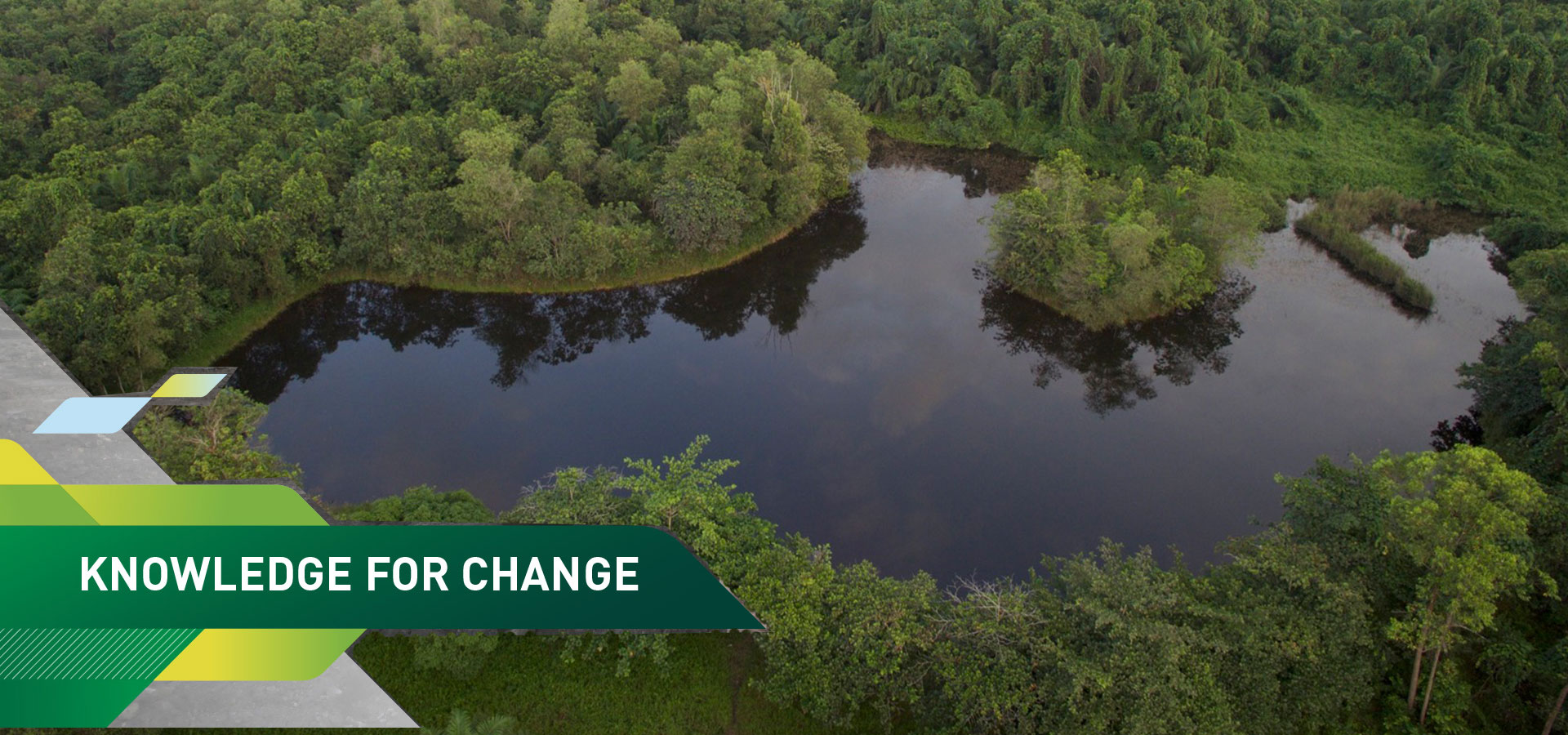SUSTAINABILITY
AEI includes ESG considerations in its every action. AEI dedication to protecting the environment and improving environmental performance through the constant implementation of green initiatives is demonstrated by integrated mining operations that take into account the ideals of good mining practices and environmental protection.
OUR VALUES, CODE OF CONDUCT, AND INTEGRITY
Our Values
To support our vision to be a leading Indonesian mining and energy group, we conduct our business in a sustainable manner to address and manage our Environmental, Social, and Governance (ESG) risks. We integrate ESG into our operations and are committed to actively contributing to shaping a sustainable future. To enhance our performance in operating business, we commit to the Adaro Values of IMORE values, which stands for Integrity, Meritocracy, Openness, Respect, and Excellence.
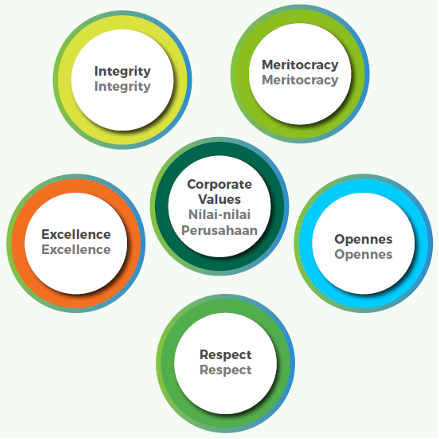
Code of Conduct
At AEI, we have a code of conduct that is applicable to all of our people. It sets out the principles and behaviors in interacting with stakeholders in an equitable manner which covers our values:
- How the Adaro Group and each individual subsidiary within the group must comply with the law as well as Good Corporate Governance (GCG) principles; and
- How each individual within the company must interact with various stakeholders including shareholders, customers, suppliers, communities, creditors, and other employees.
Anti-corruption and Fraud Policy
AEI has made a commitment to upholding the Anti-Corruption Policy as outlined in Law No. 20 of 2001 on Amendment to Law No. 31 of 1999 concerning the Eradication of Criminal Acts of Corruption. One of these commitments is carried out by strengthening and perfecting AEI's general internal controls in order to enhance fraud and corruption prevention measures like detection, inquiry, reporting, and evaluation.
All AEI employees have a responsibility to avoid insider trading, corruption, and fraud in accordance with AEI's corporate value of "Integrity". The AEI Code of Conduct and the bylaws for the Board of Directors and the Board of Commissioners both contain this duty.
Whistleblowing System
The Board of Directors or other people who can be contacted as listed on AEI’s website are to be informed immediately if any employees or other stakeholders discover an act of error, fraud, or violation of business ethics, company rules, the Articles of Association, laws, or confidential information. All received complaints will be handled anonymously.
Conflict of Interest
At AEI, we avoid conducting any transaction that has the potential to engender conflicts of interest with the company. Permission from the Board of Directors is required for anyone who has ever been, is currently engaged in, or wants to join the management, supervision, or stockholder of a company that is a direct rival, supplier, and/or has the potential to create a conflict of interest with AEI.
OUR MATERIAL TOPICS
Integrating ESG into our operations requires holistic considerations of topics that are material to our business. AEI has identified material topics that represent our most significant impacts on the economy, environment, and people. We utilized guidance from the established GRI standards to analyze and define our material topics. From the assessment process, AEI established 28 material topics to be our focus on improving our sustainability performance:
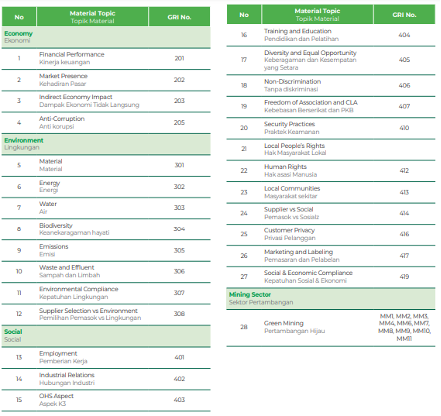
Based on the materiality matrix above, we have identified 13 material topics that are considered high priority for both internal and external stakeholders. We committed to concentrating more of our efforts on managing the material topics designated as "high priority". These topics are included in our ESG strategy framework.
OUR ESG STRATEGY FRAMEWORK
At AEI, we develop our ESG strategy framework to holistically encompass and tackle all of our material ESG topics. This framework could be the medium for our stakeholders to understand AEI’s strategy in ESG.
Sustainability Vision
Our commitment to sustainability drives how we handle business. AEI is committed to managing our ESG subjects and problems, with the UN SDGs as the driving force behind this. We shape our ESG initiatives with the following vision in mind:
“To lead with purpose towards a sustainable future”
Sustainability Mission
- mplement best practice GHG and energy management
- Maintain low environmental pollution throughout our operations
- Achieve zero occupational health and safety-related (OHS) incidents
- Secure long-term value for our stakeholders
- Support the professional and personal development of our human capital
- Manage and implement corporate social responsibility programs to support local community development
Sustainability Strategy
The general strategies applied to achieve sustainability vision are:
- Work in an inclusive manner, i.e., designate the community as a strategic partner and embrace all community groups.
- Uphold local wisdom so that the program is implemented according to needs, utilizing the potential of the community, and not conflicting with positive values that already exist in the community.
- Build multi-party partnerships.
- Geared to the principle of sustainability through capacity-building and institutional strengthening.
- Ensure that the CSR program is carried out transparently, accountably, effectively, and efficiently.
- Knowledge-sharing through local and national media.
- Diversification to green economy and initiate carbon reduction journey.
The illustration of our framework is shown below.
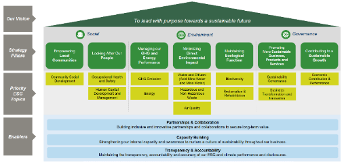
POLICIES AND COMMITMENTS TOWARDS SUSTAINABLE DEVELOPMENT
AEI is committed to sustainable development and has established a range of policies and commitments to ensure that it operates in a socially responsible, environmentally sustainable, and economically viable manner. We understand that AEI plays an important role through our program to support the following goals.
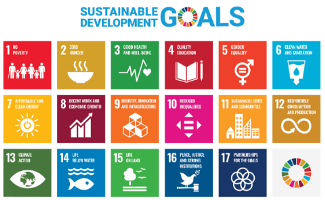
AEI has recognized Presidential Regulation No. 59 of 2017 on “The Achievement of Sustainable Development Goals” which asserts the need for the formulation of a National Action Plan (RAN) and Regional Action Plan (RAD) for Sustainable Development Goals (SDGs). The regulation determined the number of targets of the national development goals according to objectives in the SDGs
To support the national agenda on sustainable development, AEI has developed a comprehensive sustainability program that outlines our commitment to sustainable development.
GOVERNANCE
Under Governance, AEI aims to maintain our business integrity as the company transforms its business model to secure business resilience. We chose governance over profit to highlight that we believe the success of AEI extends beyond financial gain, but it is about serving a greater purpose: contributing to national development, supplying energy demand, supporting Indonesia’s climate targets and ambitions, and maintaining an ethical, transparent, and sustainable business. Focus areas under this Strategy Pillars are ‘Promoting More Sustainable Business, Products and Services’ and ‘Contributing to a Prosperous Society’.
CORPORATE GOVERNANCE
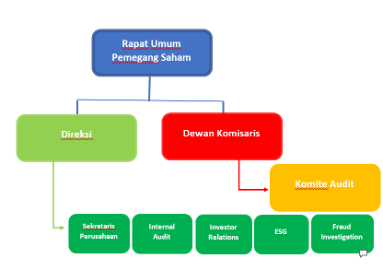
AEI Corporate Governance Structure
Law No. 40 of 2007 concerning Limited Liability Companies which has been amended by the Regulation of the Government in Lieu of Law No. 2 of 2022 on Job Creation (referred to as the "Company Law") is cited in the requirement of company governance structure. The General Meeting of Shareholders (GMS), the Board of Commissioners, and the Board of Directors make up the main bodies of AEI's governance structure. These bodies are supported by a number of supporting roles like Internal Audit and Corporate Secretary.
According to the governance system and the Company Law, the Board of Directors (BoD) makes daily operational decisions, with the Board of Commissioners (BoC) serving as a supervisor and the General Meeting of Shareholders (GMS) as the highest decision-making body and it has all the authority which is not vested with the BoD and/or BoC. The primary bodies are supported in carrying out their duties and are provided with the relevant GCG instruments from AEI, such as the Charters for the BoC, BoD, and Audit Committee. The primary bodies established the Code of Conduct, Corporate Values, as well as other operational policies which supports consistent and sustainable implementation of Good Corporate Governance (GCG). The Corporate Secretary Division is responsible for promoting the implementation of GCG. The Corporate Secretary actively communicates with all members of the BoD and other corporate functions’ personnel and is immediately accountable to the Chief Financial Officer and Director.
SUSTAINABILITY GOVERNANCE
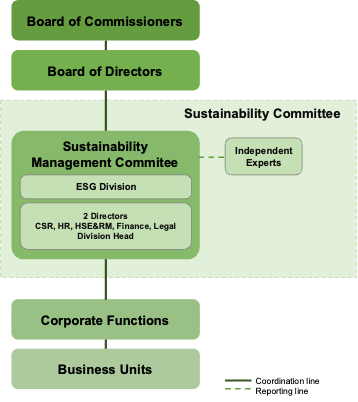
Board of Commissioners
The Board of Commissioners (BoC) supervises the Board of Directors (BoD) and grants permission for risk management and sustainability-related strategy.
Board of Directors
The BoD oversees all business sustainability management, including risks linked to climate change. The BoD monitors sustainability-related risk management, reviews sustainability-related company goals, and oversees the integration of sustainability-related problems, risks, and opportunities into strategic planning and decision-making.
Sustainability Management Committee
- The Sustainability Management Committee consists of two directors, newly established ESG Division, the head of Corporate Social Responsibility (CSR); Human Resources (HR); Health, Safety, Environment and Risk Management (HSE&RM); Finance; and Legal Divisions. The ESG Division acts as the lead of this committee.
- The Sustainability Management Committee assists the BoD in setting the strategic direction for sustainability policies and management.
- In addition, The Committee implements the sustainability policies and management by coordinating with corporate function, as well as evaluate the corporate sustainability performance.
- The Committee has a hands-on approach in determining basic policies, monitoring execution, and reviewing the effectiveness of the strategy to ensure it is consistent with the Company’s business strategy and objectives. The Committee also discusses the necessary next steps in the sustainability journey.
Independent Experts
Independent experts are experts in the sustainability field from outside AEI who are dedicated to providing advice regarding sustainability which is suitable for AEI’s business.
Corporate Functions
Corporate functions integrate sustainability-related decisions into their work to ensure the KPI is achieved as well as monitor the business unit in the KPI implementation.
Business Units
Business units carry out the assigned KPIs and integrate sustainable approaches into their business operations.
RISK MANAGEMENT
At AEI, each work unit participates in the corporate-level risk management system in an integrated manner with the goal of preserving and enhancing the organization’s or company’s value. Managing risks and exploiting opportunities are an integral part of AEI business activities. Within the AEI group, risk and opportunity management plays an important role in our internal business planning. AEI’s business involves processes from pit to power and is exposed to a wide range of external and internal influences. There are many risks that all management levels across the AEI Group need to manage in a structured and consistent manner to achieve business targets and objectives to create value to our shareholders. Every business decision is therefore based on the associated risks and opportunities.
STAKEHOLDER ENGAGEMENT
The ability to build harmonious relationships with all stakeholders is essential for the long-term viability of any firm. To support AEI Group's operational sustainability, to be able to grow together and contribute to economic development, and to improve the quality of life for people and the environment, AEI always maintains harmonious relationships with our stakeholders. As a result, AEI has made a point of carefully identifying the stakeholders who carry a weighted impact on our company’s sustainability, and we have worked to use all of our resources to try to live up to the stakeholders’ expectations. Customers, employees, communities, partners/suppliers, government/regulators, and community leaders/local officials are among the stakeholders.
Environment
Under the Environmental Pillar, AEI understands the importance of managing the environmental impacts of our business. AEI's dedication to preserving the environment in order to maximize added value for stakeholders and the environment is reflected in our commitments to manage our emissions, energy performance, water usage, and land management. The focus areas under this Strategy Pillars are: ‘Managing our GHG and Energy Performance’, ‘Minimizing Direct Environmental Impact’, and ‘Conserving Ecological Function’.
Emissions
We are committed to reduce GHG emissions from our business and are actively participating in the national and global agenda towards climate change, including the acceleration of cleaner energy provision. We are accelerating our transition and diversification plans to secure business resilience and maintain long-term stakeholder value in the face of climate adversity. The plan includes our initiatives to reduce GHG emissions from our operations and expand our portfolio in renewable energy, water, and green minerals as our “New Engines” under the Adaro Green and Adaro Minerals pillar. AEI also aims to increase the efficiency of our operations and reduce our energy consumption, while maintaining our production levels.
To manage our GHG emissions from energy usage, AEI has issued an Energy and Greenhouse Gas Policy to be implemented across all subsidiaries. The implementation of this policy is carried out through target setting on energy management. AEI through AI and SIS have acquired and kept the ISO 14001:2015 certification, the most recent version of the environmental management standard. AI adopted ISO 50001 to the Energy Management System and has developed and improved our Energy Performance Indicator (EnPI), Energy Baseline (EnB), and Energy Conservation Opportunity List (ECO List).
Carbon Abatement Roadmap Development
In 2022, AEI began developing a Carbon Abatement Roadmap to ensure our readiness to achieve sustainable growth. AEI explored carbon abatement opportunities through techno-economic and commercial analysis of every possible initiative, as well as their alignment with our business aspirations. We have assessed our four subsidiaries’ roadmap toward a low-carbon future, namely for Adaro Indonesia, Maritim Barito Perkasa (MBP), Makmur Sejahtera Wisesa (MSW), and Saptaindra Sejati (SIS). Based on the subsidiaries we have assessed, AEI will adopt the best-available technologies in low-carbon fuels and operations, renewable energy provision, and carbon sequestration to keep on track with the pathway toward a low-carbon future. In 2023, we will continue our journey to assess and develop our other subsidiaries’ roadmap
Exploring Nature based Solutions
Two companies under the Adaro Land segment hold business permits for the utilization of carbon sequestration and/or storage. This project is divided into two areas, PT Alam Sukses Lestari (Barito Lestari Forest Restoration Project-BLFRP) with ±19.520 Ha of the concession area and PT Hutan Amanah Lestari (Barito Lestari Peatland Project-BLPP) with ±25.804 Ha of the concession area.
In 2022, these subsidiaries commenced the development of a Project Design Document (PDD) to identify estimated emission reductions or removal from the concession areas. The initiatives will generate an average carbon credit claim of ~1.3M of tCO2e per annum for the next 10 years and 2.4M of tCO2e per annum for the next 30 years (with a peak of 2.7M tCO2e per annum for 5 years).
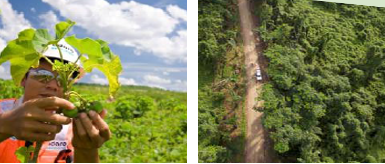
Low Carbon initiatives and Energy Transitions
At AEI, we comply with the Ministry of Energy and Mineral Resources’ regulation No.12/2015 regarding the use of biodiesel fuel, by implementing B30 initiatives since 2020 for our mining and logistics business operations. For the further initiatives, we aim to use B35 and gradually increase the use of FAME.
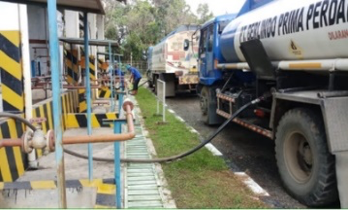
AEI has installed 130 kWp of Solar Rooftop PV, and another 468 kWp of Floating PV (FPV), the first and one of the largest installed FPV in Indonesia. The project is expected to generate up to 749,294 kWh/year and serves a captive market to support AEI’s mining operation.
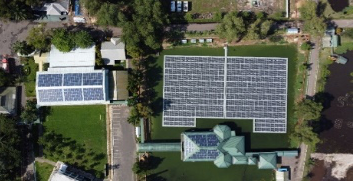
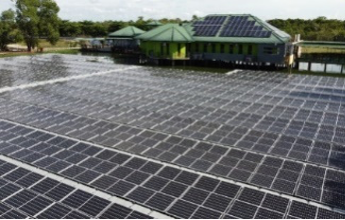
WATER AND WASTE MANAGEMENT
Our Water Management
We are aware that water and wastewater management is important to protect natural resources. Managing water withdrawal could maintain the water balance. Along with maintaining water withdrawal, we are also aware that responsible water consumption can realize sustainable water resources.
Managing water resources must also be complemented with the compliance of water discharge against quality standards. Improper management of water could lead to water scarcity and cause an unbalanced natural ecosystem. Apart from the impact on the natural ecosystem, there will be potential impacts on the social landscape with any mismanagement in this area, such as infringing on the right to clean water.
Our waste management
We handle our operational solid waste according to its category, including organic, inorganic, residue, and hazardous (B3) waste. In managing solid waste, both hazardous waste and non-hazardous waste, AEI puts forward the 3R (Reduce-Reuse-Recycle) concept
.
We realize that waste management is an integral part of environmental management. We carry out initiatives such as the utilization of organic waste as community livestock feed, waste composting as fertilizer for reclamation plants, and remaining solid waste that can still be used for operations is reused, whereas inorganic solid waste and residue that cannot be entirely utilized are sent to the landfill. AEI collects and monitors waste-related data using an online database inventory, named Adaropedia.
AEI manages hazardous waste by storing it in an authorized temporary hazardous waste storage location, before being transferred by an authorized third party in line with the applicable laws and regulations. There were no recordings of spillages during the reporting year. In addition, no waste was dumped into any waterbody.
BIODIVERSITY AND LAND MANAGEMENT, RECLAMATION & REHABILITATION
AEI recognizes the importance of ecological functions and biodiversity in sustaining our operations and contributing to the health and wellbeing of the communities and ecosystems we operate in. Our approach to managing these critical aspects is aligned with our commitment to sustainable development and is embedded in our corporate management framework.
We have established policies to ensure that our operations are conducted in an environmentally responsible and sustainable manner. We carry out the conservation in various ways, including:
- Developing sustainable biodiversity strategies, plans, and programs
- Identifying biological resources in operational areas
- Determining species that will be protected or preserved
- Identifying processes and categories of activities that have or are expected to have a significant impact on biodiversity
- Regularly monitoring and supervising the species and biodiversity
- Increasing the biodiversity status of the species that have been determined as important biological resources by conducting continuous reviews and improvements on our biodiversity protection programs.
We ensure compliance with relevant environmental laws and regulations and conduct regular internal and external audits to identify and address areas for improvement. Biodiversity management and monitoring are carried out in reclaimed operational areas or areas that are currently in the reclamation stage, as well as in the Paringin biodiversity zone. Through reclamation, we expect to maximize the development potential of post-mining areas, as is in the case of the Paringin biodiversity zone.
We recognize the importance of stakeholder engagement and collaboration in managing ecological function and biodiversity. We engage with local communities, government agencies, and other stakeholders to understand their concerns and expectations related to these aspects and work collaboratively to address them.
At AMI, in addition to AMI's mining policy which prioritizes environmental protection and maintenance, the entire Coal Contracts of Work (PKP2B) has rich flora and fauna species, which encourages AMI to carry out intensive biodiversity management. AMI conducts periodic monitoring every semester carried out by third parties. To monitor the presence of diversity in the PKP2B area, employees and work partners also conduct Biodiversity Observations (OKEHATI) throughout the year.
The Biodiversity Management Plan (BMP) preparation method is carried out in a descriptive-qualitative manner and uses an analytical approach that integrates data such as data from studies that have been conducted (EIA 2006, Social Economic Baseline Study 2006 and 2008, Social Economic Opportunity Assessment of the Lampunut Project 2015, Report on Management and Monitoring Environment 2009-2022, and OKEHATI independent monitoring report) and data obtained directly such as limited discussions with stakeholders and field surveys.
We are committed to continuous improvement in managing ecological functions and biodiversity. We monitor our performance through regular environmental audits, ecological monitoring, and stakeholder feedback.
SOCIAL
Under Social, Adaro Group recognizes that our people are our greatest assets. Given the scale and complexity of our business, it is important to place focus on strengthening our employees’ development to effectively operationalize ESG and sustainability within the Group. Furthermore, we understand the need for Adaro Group to support and empower our local communities. Therefore, we aim to continuously improve our performance in improving livelihoods. The focus areas under the Strategy Pillars are: ‘Empowering Local Communities’ and ‘Looking after Our People’.
EMPOWERING LOCAL COMMUNITIES
Adaro Group’s business generates both positive and negative impacts on both environmental and social aspects. An Environmental and Social Impact Assessment (ESIA) is carried out at the planning stage of all Adaro Group’s business activities to be able to discern the potential impacts that may arise from the Group's activities. The study involved representatives of the community and village apparatus from villages around the operational area that could potentially be affected by the Group's operations. Their involvement was mainly via public consultations. A social mapping study has also been made involving relevant stakeholders. Adaro Group has carried out various social initiatives that have involved and reached women and other marginal categories which were included in the social mapping results.
The CSR program initiatives carried out by the Adaro Group are based on the results of the social impact assessment and social mapping studies which are periodically updated to ensure suitability for the conditions of the surrounding community. CSR programs are designed by aligning the communities’ needs with the local potential and Adaro Group’s businesses to create shared value (CSV approach). In 2017, Adaro Group, through the Adaro Foundation (Yayasan Adaro Bangun Negeri – YABN), came up with a new CSR flagship, which also represents its main mission, namely: Adaro Ignites Change (locally known as Adaro Nyalakan Perubahan), as Adaro Group aspires to be the agent of change in the regions where it operates for better living standards. Adaro Ignites Change consists of five target areas, each of which represents an important aspect of life.
These are several of our intiatives and performances during 2022:
292 scholarship awardees in South Kalimantan and Central Kalimantan Province through the Indonesia Bright Future Leaders (IBFL) program. The scholarship covers education cost, living cost, settlement cost, accommodation cost, health cost, mentoring, and internship

- Dayak Deah Desa Liyu, a coaching program for a traditional village through the Adaro Ignites Culture program. The program shows significant results whereby the village received an IDM (Indeks Desa Membangun) status of developed village in 2022 with IDM score of 0.7552 from the lagging village status in 2019 with IDM score of 0.5257.
- The CSR program has covered 100% of the Adaro Group’s operations and is carried out within the five pillars of Adaro Ignites Change, which has been and is being implemented in all districts where the operational area is located, and especially in Ring 1 of the operational area.
-
30 Years of Work, Adaro Shares for the Nation
In commemoration of its 30th anniversary in 2022, Adaro Group distributed 30,000 basic food packages for the underprivileged. This is motivated by the condition of rising fuel prices which triggered an increase in the price of necessities. Adaro Group aimed to lighten the burden of the underprivileged in seven provinces which are Adaro Group's operational areas: DKI Jakarta, South Kalimantan, Central Kalimantan, North Kalimantan, Riau, Central Java and East Java Provinces.
In its implementation, the Adaro Group cooperated with Rumah Zakat, Pundi Amal Peduli Kasih Foundation, and Metro TV as partners for the distribution of basic food packages. We also involved students receiving IBFL scholarships as volunteers, Adaro-assisted Islamic boarding schools to prepare and distribute in several areas, as well as subsidiaries in each distribution area.
LOOKING AFTER OUR PEOPLE
Adaro Group has developed its occupational, health and safety (OHS) policy, established in 2016, which applies to the whole group. In developing this policy, we aligned it with the Company’s vision and mission as well as considering the scale and risk of OHS to ensure all OHS aspects are covered.
AEI is an integrated mining and energy company. AEI pursues its vision of becoming Indonesia's leading mining and energy group by continuously expanding and enhancing its coal mining and non-coal mining operations to create a complete supply chain from pit to power plant. The integration of AEI certainly has risks related to quality, occupational health, safety, and environment (MK3LH). These risks need to be managed properly so that operations can run smoothly and safely.
The management of AEI's MK3LH can be likened to a building consisting of foundations, pillars and a roof. As the foundation are natural resources (coal reserves), human resources (technical and management capabilities), financial resources, and completeness of business permits
HUMAN CAPITAL DEVELOPMENT AND MANAGEMENT
Human resource excellence is a part of our strategy to enhance Adaro Group’s competitive advantage. Adaro Group’s respect for diversity is shown by providing equal opportunities for every individual regardless of their sex, age, race, gender, and disability to continue to develop. Diversity is an important element in human resources as we believe that each employee has unique potential that can be combined to become a maximum driving force for AEI. Adaro Group is committed to recruiting, developing and retaining people who are professional and with integrity. The Adaro Group also opens career paths based on the best performance of employees according to the Meritocracy principle in Adaro Values. With a corporate culture based on the values of “IMORE”, we continue to prepare high-quality future leaders, namely those who have outstanding competencies in their respective fields accompanied by good professional and ethical character.
